Acquisition trip West Africa 22 April to 28 May 2025
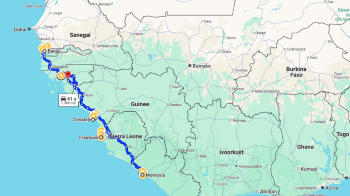 In the spring of 2025 I, Gerard van de Bruinhorst, visited the capitals of The Gambia, Guinea-Bissau, Guinea, Sierra Leone and Liberia on behalf of the ASCL Library.
In the spring of 2025 I, Gerard van de Bruinhorst, visited the capitals of The Gambia, Guinea-Bissau, Guinea, Sierra Leone and Liberia on behalf of the ASCL Library.
Lucky coincidence was that a few weeks earlier Heleen Smits visited the Salon du Livre Africain de Paris, where the (French part of) Cameroon was the guest of honour. Both acquisition trips express the ASCL’s commitment to continue to develop the impressive African francophone collection which had been taken care of for the last few decades by our former colleague Elvire Eijkman.
Improved connectivity and close cooperation with Leiden colleagues resulted in the acquisition of more than 1000 physical books and contextual items in print and digital (eg. newspapers, music, pamphlets, Bible translations and cookbooks) both from the five visited countries and the wider West African region.
One of the highlights is the corpus of 200 textbooks used in all levels from Kindergarten to tertiary institutions. This is a valuable addition to the growing European textbook collection from Africa, and as part of a closer collaboration with our German colleagues at the Global Textbook Resource Center the metadata of these publications will soon be visible in their continuously comprehensive catalogue consisting of educational materials from every corner of the globe.
Guinea
 Conakry (designated world book capital in 2017) since 2009 organises the bookfair 72 heures du livre which was held at the Esplanade du Palais du Peuple.
Conakry (designated world book capital in 2017) since 2009 organises the bookfair 72 heures du livre which was held at the Esplanade du Palais du Peuple.
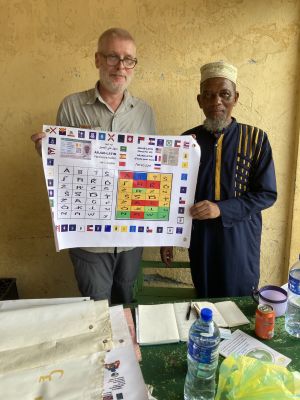 The 45 books written in the Adlam script developed in the 1980’s by the two brothers Ibrahima and Abdoulaye Barry to transcribe the Pular language seem to be the largest public library collection in the world. This contradicts the general opinion that many writing systems (in Africa) are on the verge of extinction. Aboubacar Barry (yes, related to…) provided a personal introduction of his self-developed writing system which enables people already acquainted with the skill to read one alphabet, to learn another alphabet.
The 45 books written in the Adlam script developed in the 1980’s by the two brothers Ibrahima and Abdoulaye Barry to transcribe the Pular language seem to be the largest public library collection in the world. This contradicts the general opinion that many writing systems (in Africa) are on the verge of extinction. Aboubacar Barry (yes, related to…) provided a personal introduction of his self-developed writing system which enables people already acquainted with the skill to read one alphabet, to learn another alphabet.
Another of the Guinean highlights was the digital subscription to Horoya, the party newspaper from the Parti Démocratique de Guinée, strengthening the existing microfiche collection. My ‘discoveries’ of ‘unknown’ Malinese publisher Les éditions plumes inspirées and the Conakry based innovEditions illustrate the thriving book industry in the francophone world.
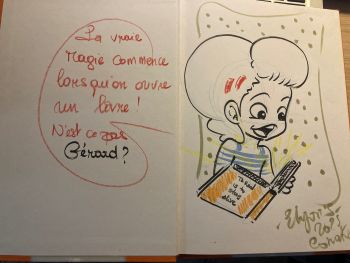 One anecdote: trying to stick carefully to our collection profile (and therefore leaving out the Congolese diaspora in France), and in a hurry to pay for all my acquisitions at one of the stands, the seller said: “you have bought all the books, except the one’s I wrote myself”… So I agreed to add her books (I am such a pushover….) and (after having inquired who I was and where the book would end up) she drew a highly personalised dedication, especially for our ASCL library visitors!
One anecdote: trying to stick carefully to our collection profile (and therefore leaving out the Congolese diaspora in France), and in a hurry to pay for all my acquisitions at one of the stands, the seller said: “you have bought all the books, except the one’s I wrote myself”… So I agreed to add her books (I am such a pushover….) and (after having inquired who I was and where the book would end up) she drew a highly personalised dedication, especially for our ASCL library visitors!
Liberia
 I spent the second week in Liberia’s capital Monrovia. Liberia is from a librarian’s perspective a strange country: although it is anglophone, it is not part of the Commonwealth so it is often ‘forgotten’ by UK oriented book fairs and vendors. It was also an expensive country; in the other countries I could survive on 15 euro per day (food and accommodation) but not in Monrovia. Apparently here NGO’s with their deep pockets have prevented the development of a budget market. The Liberian poet Abraham Conneh writes in his poem ‘You NGO people’:
I spent the second week in Liberia’s capital Monrovia. Liberia is from a librarian’s perspective a strange country: although it is anglophone, it is not part of the Commonwealth so it is often ‘forgotten’ by UK oriented book fairs and vendors. It was also an expensive country; in the other countries I could survive on 15 euro per day (food and accommodation) but not in Monrovia. Apparently here NGO’s with their deep pockets have prevented the development of a budget market. The Liberian poet Abraham Conneh writes in his poem ‘You NGO people’:
“We must change the price tags / But when you come to our towns / With your mineral bottles, flip charts and colourful markers / Blue faded jeans and air cool vehicles / In the name of community development, / We wonder what development to our towns have you brought? / What roles have we played in / Your well-crafted ‘Success’ stories?"
The former building of the Department of Education is an excellent place to get (new and second-hand) publications. In front of the post office I found a newspaper vendor selling old newspapers as old as 2023, and the Ghanaian Star Books has a subsidiary in Crown Hill. Here the usual Longman/Pearson imprints are dominant, but fortunately more and more educational books are explicitly adapted to the Liberian curriculum (marked by “Liberian edition”). The newspaper Inquirer has an extensive, partly digital, archive and Archie Williams has developed an impressive private archive of Liberian newspapers.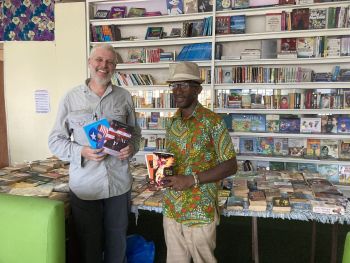
The most inspiring meeting was with Othniel Forte. Fred van der Kraaij (still a celebrity on the University of Liberia campus) introduced me to this writer, publisher, community activist etc. Forte Publishing just moved to United Nations Drive/ Sekou Touré. Here he leases a nicely furnished reading room where kids come after school hours.
Sierra Leone
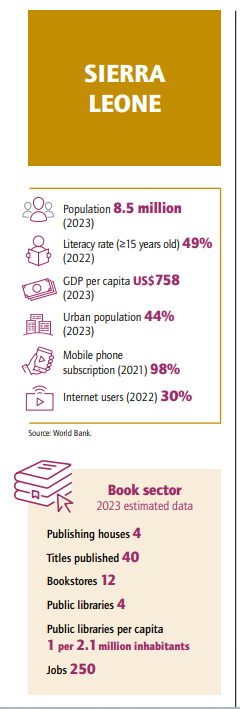 Several shared taxis (‘sept-place’) brought me finally to Freetown. Both Liberia and Sierra Leone have a strange newspaper industry. Apart from very few daily newspapers, most of the media are only printed when they have sold an advertisement (the only party selling advertisements is the government, so from a freedom of expression point of few, this is a challenge I suppose). It was absolutely helpful my accommodation was run by a newspaper businessman. Additional advantage was that there were no other guests (the flip side of this coin was an adjacent bar….).
Several shared taxis (‘sept-place’) brought me finally to Freetown. Both Liberia and Sierra Leone have a strange newspaper industry. Apart from very few daily newspapers, most of the media are only printed when they have sold an advertisement (the only party selling advertisements is the government, so from a freedom of expression point of few, this is a challenge I suppose). It was absolutely helpful my accommodation was run by a newspaper businessman. Additional advantage was that there were no other guests (the flip side of this coin was an adjacent bar….).
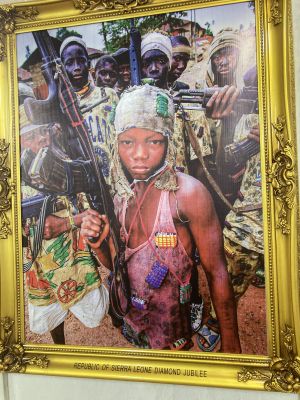 Highlight was the contact with Sierra Leonian Writers Series publisher Mallam O. whom I got to know through our ResMa student Christiana Banja. Print copies of the SLWS are extremely rare, and all his stock is only available through Amazon. Thanks to Marijke van der Lee, the series will soon be completely available in Leiden.
Highlight was the contact with Sierra Leonian Writers Series publisher Mallam O. whom I got to know through our ResMa student Christiana Banja. Print copies of the SLWS are extremely rare, and all his stock is only available through Amazon. Thanks to Marijke van der Lee, the series will soon be completely available in Leiden.
Close to the Submissive-wife-and-Husband-is- Head-supermarket (no joke), is the Bookshop CLC. Together with the Smart Link bookshop near Congo Cross these two outlets seem to cater for most of the book market.
Difficult to find but extremely impressive is the Peace Museum. An exhibition shows how the trials in Sierra Leone and Liberia ‘profited’ from the language experience from earlier tribunals like those in Bosnia and Rwanda. Especially simultaneous translations from and into undocumented languages, is a challenging task.
Guinea-Bissau

From several perspectives Guinea-Bissau is the ‘odd-man-out’, the only Lusofone country, the only country using the CFA currency, the least productive book industry (measured in annual number of titles published annually), and so on. The ASCL community members again proved to be of priceless assistance (thank you Philip Havik!), because the existing literature was quite outdated. Most of Oliver Balch’s observations from 2018 still describe accurately the current situation:
“As illustrated by the books on the counter [of the bookshop Coimbra Livraria, GCvdB], most of the country’s literary output finds its way into print via Portuguese publishers. With no domestic printing capacity of its own, Guinea-Bissau’s two lone publishers, KuSiMon and Corubal, also have to send their books to Portugal for printing.”
Especially his apt description of the ‘pop-up-bookselling’ was a new experience for me:
“Bissau does witness occasional pop-up book fairs, but these are short-lived and infrequent. As for buying books off the shelf, other than a small Catholic store selling missals and bibles, the only option is Coimbra, where, despite attempts to keep prices low, the costs exceed most people’s budgets” [source: https://www.ft.com/content/39c6ae20-ffb5-11e8-ac00-57a2a826423e].
I was on the look-out for these events, and therefor I attended cultural events such as the Art Biennale (see the New York Times article) which took place in different venues, and book launches at the Centro cultural franco guineense. Among others I was present at the launch of Peter Mendy’s Portuguese translation of his book on Amilcar Cabral and the novel by Lizidoria Mendes. The introduction of Carlos, the president of a very active club of booklovers (fortunately fluent in French), to key actors of the book industry, was very much appreciated. Against this backdrop the ‘harvest’ of 58 books, 75 newspapers and 7 Bible and Qur’an translations, was probably not too bad.
Gambia
 Finally Gambia, the easy part of the journey: a well developed tourist and book publishing industry, with a great bookshop Timbooktoo run by Katie and Ousmane and a friendly staff. Fulladu Publishers at the MDI road is also worth a visit although most of its stock we also get through other providers. But being the first library to catalogue books like Contribution of Gambia's Islamic scholars in reviving Arabic and Islamic knowledge and the almost 600 pages in-depth migration study “No back way to Europe” is always nice!
Finally Gambia, the easy part of the journey: a well developed tourist and book publishing industry, with a great bookshop Timbooktoo run by Katie and Ousmane and a friendly staff. Fulladu Publishers at the MDI road is also worth a visit although most of its stock we also get through other providers. But being the first library to catalogue books like Contribution of Gambia's Islamic scholars in reviving Arabic and Islamic knowledge and the almost 600 pages in-depth migration study “No back way to Europe” is always nice!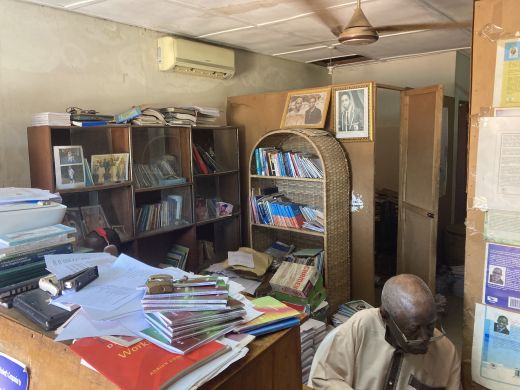
Gerard van de Bruinhorst
Infographics on the country's book sectors are from the report The African book industry : trends, challenges & opportunities for growth/ ed. by Toussaint Tiendrebeogo, Caroline Munier and Carmen Thong, United Nations Educational, Scientific and Cultural Organization. Paris : United Nations Educational, Scientific and Cultural Organization UNESCO, 2025.

